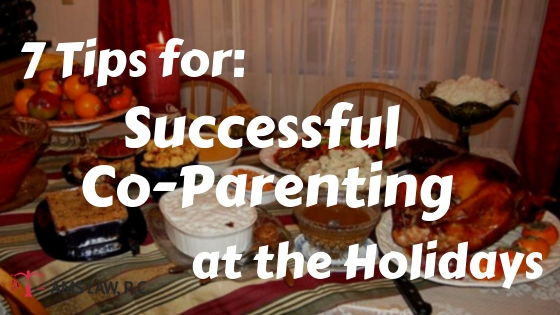The holidays are a magical time. Children have breaks from schools; families and friends gather for meals and multi-day celebrations; and emotions run hot. This means the holidays are magical. They can also be an incredibly tough time to deal with co-parenting and/or split custody.
To make sure your holidays remain magical for you and your children, it’s important to have a plan. Here are some tips to help you set your holidays up for success.
This is the first in a series of articles AMS Law is writing to assist you in making your holidays a success. This article focuses on creating a plan for success. Our next article will focus on discussing your custody situation with and around your extended family. Links to each article of the series will be added to this post as they are published.
1) What is the Plan?
This basic step can save you many arguments and much heartache. A brief conversation with your co-parent outlining the general plan for the holidays (even if done through counsel) is hugely important. This conversation should focus on your goals for the holiday season (to put it differently, defining what’s important to you for the period of time), the logistics (pick-up times and locations), and how to handle problems. All of these are detailed below, but each one should be considered as part of a larger plan. A plan that, when possible, is worked out in advance of the holidays.
2) Are there Events that are Important to Each Respective Parent?
Identifying your goals, or most important events, of the holiday season is key to a happy holiday season. Identifying what you find important can also help make you more flexible about events that are less important to you. When both parents want the same time (example: Christmas morning), then it’s important to find compromise in advance. Doing it in advance will allow you to focus on the positives of the time you do have, rather than the negatives of the time you feel you are “losing.”
If you want your priorities respected, identify them to your co-parent and be prepared to respect their priorities.
This question can be extended to events important to key extended family members. If Grandparents or an aunt or uncle will be angry for years about a child missing a dinner, it is important to include this in the discussion between co-parents.
3) Consider Planning Events with Both Families (if possible)
If, and when, possible consider co-hosting key moments during the holiday to ensure both parents are included. This may not be your ideal, but consider if it would be your child’s ideal experience.
If parties are agreeable, this is a great way to show a child/children they are loved and the focus is on them.
4) Be Clear on Timing (and Logistics)
Building upon your priorities, create a plan that includes pick-up/drop-off times and locations and builds in travel time. (Example: if your event goes from 4-6pm, and the drop-off point is 30 minutes away, you will NOT be there at 6:30pm). Being clear about the logistics, the meetup points, and the timing of any exchanges, will help you stay calm. Particularly if you keep in contact and alert your co-parent to any adjustments and developments in your travel schedules.
Most importantly, respect each other’s time. If you would not want someone to be late, then don’t be late for them.
5) Talk Through Gifts
Gifts have become a part of most family’s holiday celebrations. This includes gifts from parents as well as extended family. It can be very helpful for co-parents to talk through their child’s “wish list.” This can avoid duplication, or one parent feeling threatened because they did not give as much as the other.
The financial realities of both parents’ situations should play a role in this discussion. These realities should also be shared with extended family to the extent that it can help a child feel equally cared for through the material goods given to them. To put it another way, try to avoid gift giving competitions.
Your goal is a happy child/children at the holidays. Not, “who gave the most things.”
6) Bad Weather
Bad weather is just one of the many things that can mess with timing during the holidays. It’s important to keep everyone updated on potential bad weather. Further, have a plan in advance.
During your planning phase, discuss what will happen if weather gets very bad. If, for example, everyone is “snowed in,” how will you decide to abandon/adjust plans for a meetup?
Remember you would not want anyone risking their life to make an event. Be prepared on how to adjust. It may not be the best outcome, but giving your child an extended time on FaceTime or Skype with your co-parent may be a great way to deal with weather interrupted time.
7) Be Patient
Planning is a key step. Having patience while trying to execute the plan is crucial to maintaining everyone’s enjoyment of the holidays. For example, help yourself by giving your co-parent some wiggle room on logistics. You should plan at least 15 minutes of flex time around any child exchange. If weather gets worse, you will need more flex time.
Remember to breathe. It may infuriate you that plans change, or some member of the family interferes with your plan, BUT your child is more likely to remember you losing your temper than the event that interfered with the plan. When something goes wrong, you can absolutely feel angry. The suggestion here is to try to have some patience, and focus on your child’s priorities.
The holidays can be stressful for all involved. They can also be magical. Focus on your child/children and be patient with everyone involved. These two steps (plus a bit of planning) can help everyone have a more enjoyable holiday season.
If the above gets difficult, or you have problems during the holiday season, call AMS Law: 484-704-7807.

